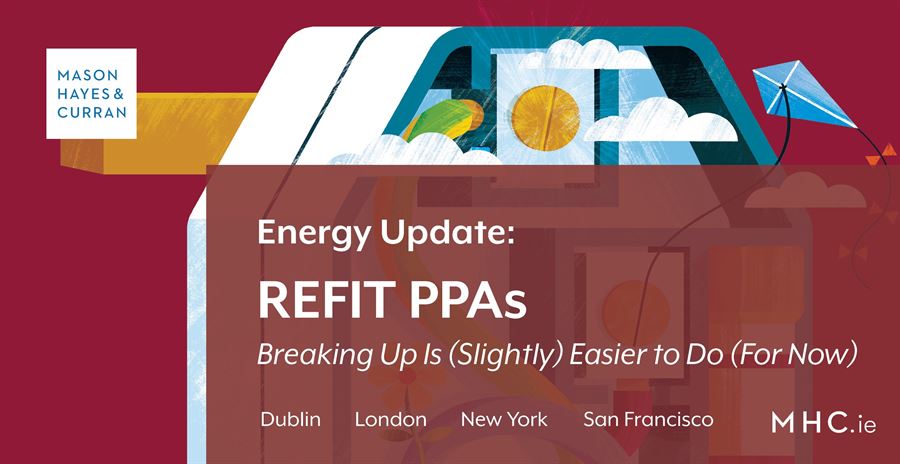Energy Update: REFIT PPAs – Breaking Up Is (Slightly) Easier to Do (For Now)

It is a singular feature of Ireland’s REFIT renewable energy schemes that financial support is paid to the off-taker under a power purchase agreement (PPA), rather than the generator – even though it is the generator who owns the renewable generation asset that produces the renewable energy that is the target of the policy.
 ‘Termination before expiration’
‘Termination before expiration’
The REFIT support is received by the off-taker and is then used to subsidise the payments that the off-taker is obliged to make to the generator under the PPA. The continued flow of these support payments therefore depends upon the continued operation of the PPA. However, as any commercial lawyer knows, private contracts do not always run smoothly, and there may be reasons, commercial or otherwise, why a PPA needs to be terminated prior to its intended expiration.
Transferring support under REFIT 2
The rules of the respective REFIT schemes acknowledge that PPAs may be terminated, and provide that if this happens – and with the prior written consent of the Minister – a REFIT-supported generator can transfer its REFIT support to a new PPA with a new off-taker. In the case of REFIT 2, there is an additional requirement that the termination occurred “due to a circumstance beyond the control of the REFIT 2 applicant”.
While the REFIT rules are not prescriptive as to when a change like this may occur, the Department of Communications, Climate Action and Environment has chosen to administer this PPA transfer process by opening occasional “windows” during which the REFIT-supported generators can apply for permission to migrate their REFIT support to a new PPA and off-taker.
Date for the diary
The latest such window was announced by the Department on 4 March 2019, and runs until 1 July 2019.
A number of aspects of this process make it very difficult, in our opinion, for any REFIT-supported generator to actually avail of it – in particular:
- The outgoing off-taker must undertake to be responsible for any REFIT reconciliation payments during the post-termination period, and
- The transfer between PPAs needs to be “seamless” and a PPA needs to be in place “at all times”
The overriding commercial issue is that the mere availability of the REFIT transfer process does not, of itself, allow a REFIT generator to terminate the PPA and/or compel the outgoing off-taker to co-operate with the process. Any termination right needs to have arisen separately under the PPA, and been exercised – and all on a timeline that meshes exactly with the requirements of the REFIT transfer process.
In circumstances where the parties to the terminated PPA are no longer cooperating with one another (eg. where the outgoing off-taker is insolvent, or is disputing any right of the generator to terminate the PPA), then it is not clear how the generator will be in a position to deliver the undertaking, and seamless transition, that is required.
Conclusion
There can be no doubt that the “go-live” of the ISEM wholesale market arrangements in late 2018, and the need for new balancing exposures to be absorbed by the parties to REFIT PPAs, has caused tension between these parties.
While the opening by the Department of a REFIT transfer window looks like a move that promises to improve the bargaining position of REFIT generators, in practice it may be difficult for any such generator to avail of the process. The need for the co-operation of the outgoing off-taker, in each case, means that the commercial bargaining power is weighted in favour of the off-taker.
In our view, the Department could do more to improve the practical usefulness of the process – namely, by reducing the extent to which the close cooperation of the outgoing REFIT off-taker is required.
For more information on how and whether your REFIT-supported project might be able to apply to change its PPA off-taker, contact a member of our Energy, Utilities & Projects team.
The content of this article is provided for information purposes only and does not constitute legal or other advice.
Share this:


